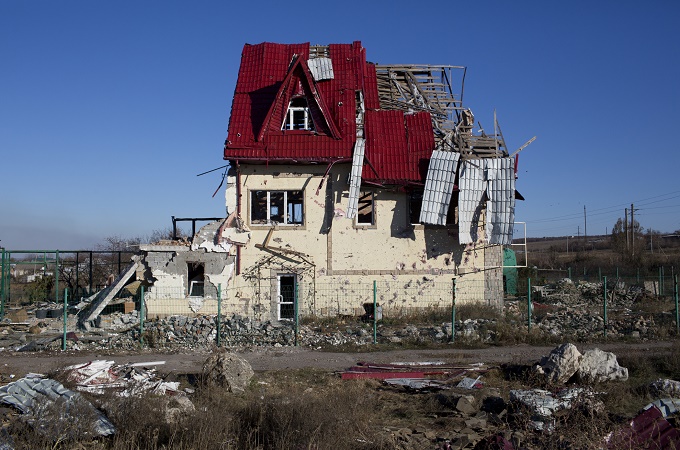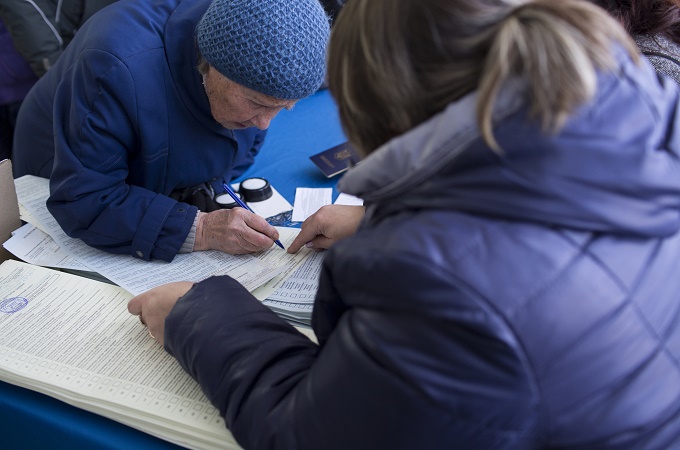Ukraine vote: A view from the war-torn east
In Semyonivka, where the Ukraine army is blamed for razing the village, any voting can be seen as a win for democracy.

Published On 28 Oct 2014
Semyonivka , Ukraine – A pack of dogs snarled and snapped as they harried an outcast down a lane running through the destroyed village of Semyonivka, on the outskirts of Slovyansk city in eastern Ukraine.
On either side of the street, modest, handmade homes of brick and wood stood gutted in the sharp October air. In intense fighting earlier this year, roofs were blown off as the Ukrainian army traded artillery volleys with pro-Russian rebels. Now, windows stand out like empty eye sockets against the sky.
Through this scene of desolation, small groups of people walk to the freshly painted village school to cast their vote in Ukraine’s first parliamentary election since the toppling of former president Viktor Yanukovich during the EuroMaidan protests in Kiev in February.
“We’ve had 248 people vote out of a possible 1,538 as of 2pm,” says Yuliya Zubritskaya, head of the polling station’s election commission. That’s a little more than 16 percent turnout.
I asked you to vote for a democratic, reformist, pro-Ukrainian and pro-European majority. Thank you for having heard and supported this appeal.
Yet, that anyone came out to vote at all – in a place where many say the Ukrainian army is responsible for the razing of their community – can be seen as a win for the democratic process, if not reconciliation.
Widely seen as a bid by President Petro Poroshenko to cement his leadership and put the country on a solidly pro-western path, the snap elections have done just that, with pro-European parties sweeping to power.
With 50.1 percent of electronic voting reports processed by 2pm on Monday, the People’s Front party – headed by Arseniy Yatsenyuk, the hawkish prime minister and Poroshenko ally – had taken 21.6 percent of the vote.
Poroshenko’s own bloc had 21.5 percent. The Self Reliance (Samopomich) Party was in third place with 11.1 percent of the vote. The victories were trumpeted by the press as a resounding call for a pro-western course in Ukrainian politics.
“I asked you to vote for a democratic, reformist, pro-Ukrainian and pro-European majority,” said Poroshenko on his website. “Thank you for having heard and supported this appeal.” Poroshenko said more than three-quarters of voters “powerfully and irreversibly supported the course towards Europe”.
‘Lots of people left’
Across the country, however, voter turnout varied widely, possibly illuminating the amount of faith in the elections. By the close of polls, only about 50 percent of registered voters had gone to the voting booth. The highest percentage was in the western Lviv region – about 70 percent – while the lowest was in areas of the
Donetsk region, now under government control, where about 30 percent turned out.
Although this could be seen as showing a lack of belief in the election in an area of the country that is more pro-Russian, Zubritskaya of the Semyonivka election commission said there could be a demographic reason.
“Lots of people left. Lots of houses were destroyed,” she says.
Currently, there are more than 430,000 internally displaced people from the conflict scattered within the country, the UN High Commissioner for Refugees reports, and possibly more than a million Ukrainians have fled to a new life in Russia.
International election observers said between the rebel-controlled areas of Donetsk and Luhansk provinces, and the Russian-annexed province of Crimea, as many as 10 percent of voters might have been prevented from casting ballots.
In war-shattered villages and cities such as Semyonivka and Slovyansk – once the epicentre of the pro-Russian separatist uprising – turnout was small but there was a steady flow of people into the yellow and blue shrouded polling booths. After the army surrounded the city and began shelling it this summer, it was a surprise to see anyone voting at all, let alone for pro-western parties.
 |
| Intense fighting earlier this year destroyed many homes as the Ukrainian army traded artillery volleys with pro-Russian rebels [John Wendle/Al Jazeera] |
“We thought the government was made up of a bunch of liars and we decided on the separatists. But when we lived near the separatists for three months, we realised that under their rule, there was no law,” says Zubritskaya, who fled to Russian-controlled Crimea with her family at the height of the shelling.
“Now we have decided to go back to the side of the government. To learn this lesson we paid a very, very high price. People are voting today to get rid of Yanukovich’s supporters in parliament. But, of course, the main issue is that we all want the war in the Donbass to end.”
So far more than 3,700 have been killed in months of fighting, the UN reports.
Paying the price
Grigoriy Ilchenko came to vote with his wife, daughter, son-in-law, and grandson. At one point during the shelling, they spent 15 hours straight in a small cellar under their house. They never fled throughout the two months of battles that raged around their home.
“Where would we have gone? If we had left, we would have lived as homeless people,” he says. “We had two shells strike our house and we paid to repair the roof ourselves. The government has only given us moral support.”
His grandson chimed in, adding a third shell had blown up in their courtyard. “Without question, we want to be united. We want Ukraine. I can say that today we voted for peace, for an end to this war,” Ilchenko says.
Former minister of social policy and head of the Ukraine Forward Party Natalia Korolevska voted in
Slovyansk at the polling station in School No 12. She echoed Ilchenko’s sentiment.
“The most important issue in this election is peace. I’ve voted for peace.” But she added: “Second, I’ve voted for economics. I’ve voted for a good economy. Today is an exam of the health of Ukraine. Tomorrow we will answer to the people.”
With a ceasefire in place in name only between the Ukrainian army and pro-Russian rebels in Donetsk and Luhansk, vast swaths of territory still out of government control, and the current prime minister of the Donetsk People’s Republic, Aleksandr Zakharchenko, threatening to start combat operations again, the war is the first thing that needs to be resolved in Ukraine. But the economy is a close second.
On my pension, I can't buy a washing machine, or a car, or even a new coat sometimes. There is no one on those lists who represent my interests.
Currently Ukraine is flat broke and is relying on clean elections to show donors in the West that it means to clean up corruption that will ensure future aid packages. Ukraine’s economy could slide by as much as 10 percent this year, and Kiev will likely have to ask for an expansion of a $17bn lending programme from the International Monetary Fund.
Out of gas
On top of that, Russia has cut off gas supplies amid a payment dispute and the Ukrainian currency, the hryvnia, has lost about 40 percent of its value against the dollar since the start of the year.
“On my pension, I can’t buy a washing machine, or a car, or even a new coat sometimes,” says Vitaly, a 55-year-old pensioner outside of School No 12. He did not plan to go in to vote.
“There is no one on those lists who represent my interests. There is no box to tick to say I am against everyone. There are no Communists on the lists,” says the former factory worker.
“We don’t need the European Union, we export to Russia. If we can only export to Finland and Poland, it means we won’t have work. If we don’t have work, we don’t have bread – and I want bread. Ukraine must be united, there is no question, but they can’t tell us who to trade with.”
Indeed, with the conflict showing little sign of halting and the economy crippled, Poroshenko and the new parliament will have their work cut out for them. Yet, Ukraine is in such a tight spot that even an overwhelmingly pro-eestern majority in parliament could pose a challenge, since compromise and negotiation with Russia will be hampered by a nationalist, pro-western legislature.
“There is increased danger that again calls will be made from the tribune to use force and military methods, as well as bloodshed to solve all the problems, because straightforward nationalistic and chauvinistic powers have received support and will become representatives in the Verkhovna Rada [parliament],” Russia’s RiaNovosti news agency quoted Russian Deputy Foreign Minister Grigory Karasin as saying.
 |
| People in the east cast votes in Ukraine’s first parliamentary election since the toppling of former president Viktor Yanukovich [John Wendle/Al Jazeera] |
Populist Oleh Lyashko’s Radical Party took 7.4 percent of the vote, while the hawkish Fatherland (Batkivschyna) Party took 5.7 percent. Both are on the nationalist end of the spectrum, in a country that has been radicalised by war, and both have cleared the 5 percent hurdle to get into parliament.
‘Things have gotten really weird’
Ironically, Poroshenko may now be in need of help from the Opposition Bloc – the proxy of the Party of Regions, the once powerful party of deposed president Yanukovich – in carrying out negotiations with Russia and the pro-Russian rebels in the country’s east.
Since their electoral bases were in Crimea and the country’s east, they only secured 9.8 percent of the vote, but enough to squeak into the Rada.
“Things have gotten really weird around here. You should see the people sitting on the commission. I haven’t changed my idea towards my country, but there are people on the commission who have,” says Yuri Nakonyechniy, head of the election commission at School No 12, and a baker who continued to bake bread throughout the siege in order to feed his family.
“There are people who suffered during the war and now they’re opposed to the government. After everything that has happened here, I understand them,” he says.
In this muddled atmosphere, with so much potential for continued conflict, Nakonyechniy’s sort of understanding is in short supply, and much in need.
Source: Al Jazeera